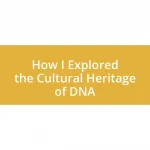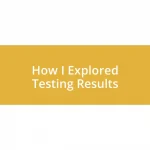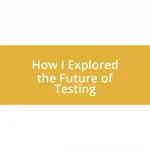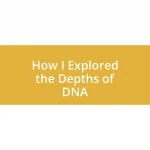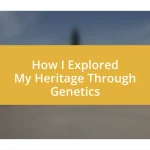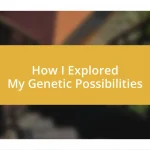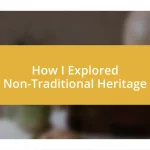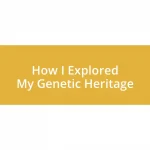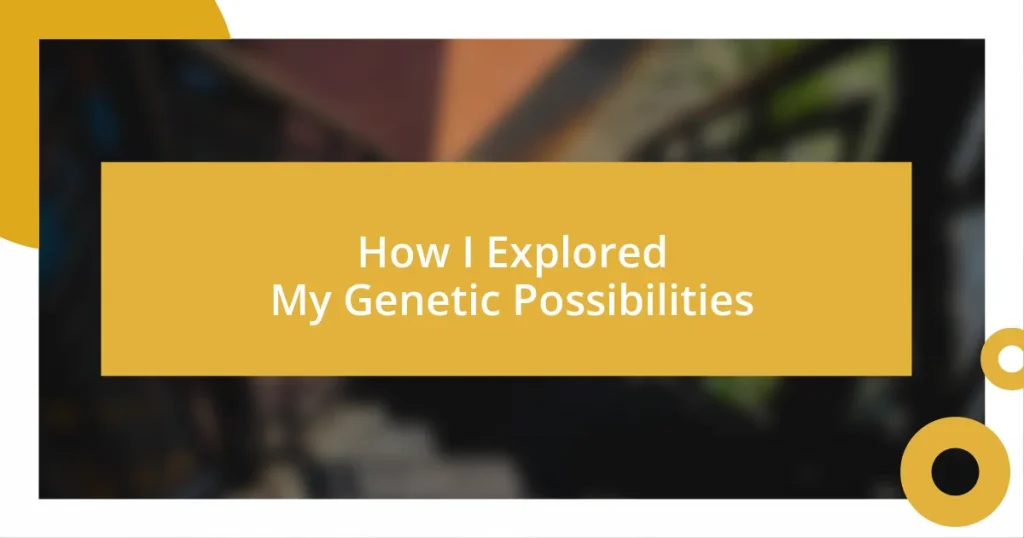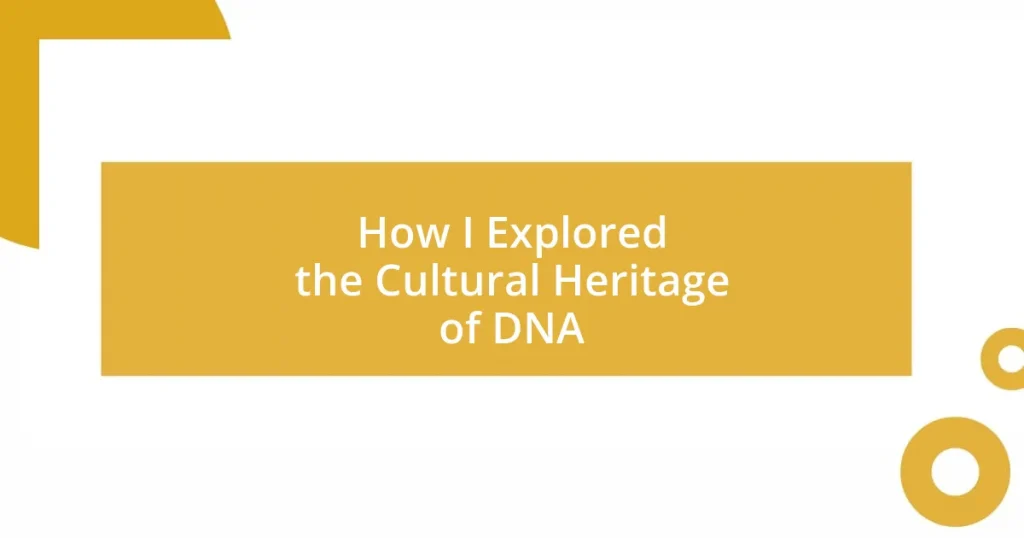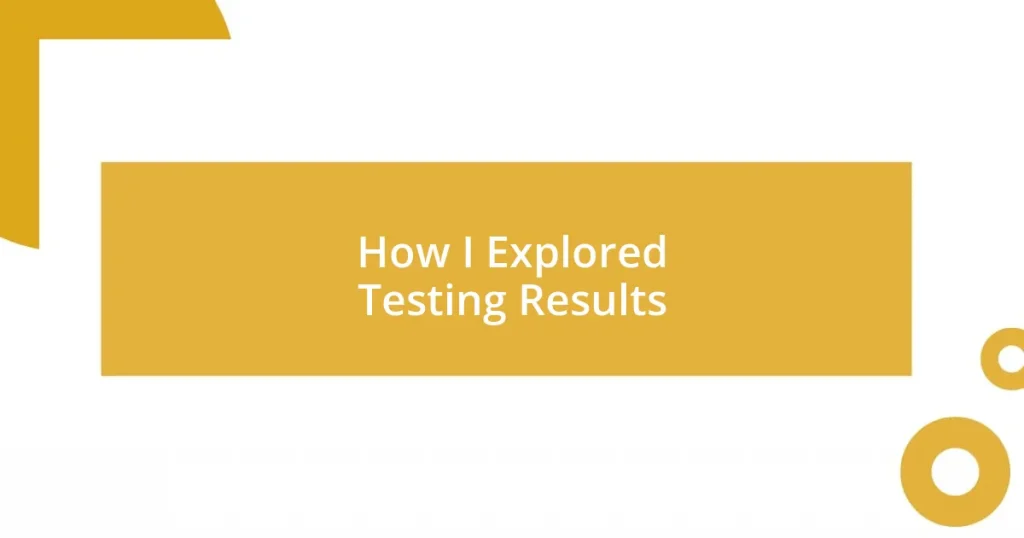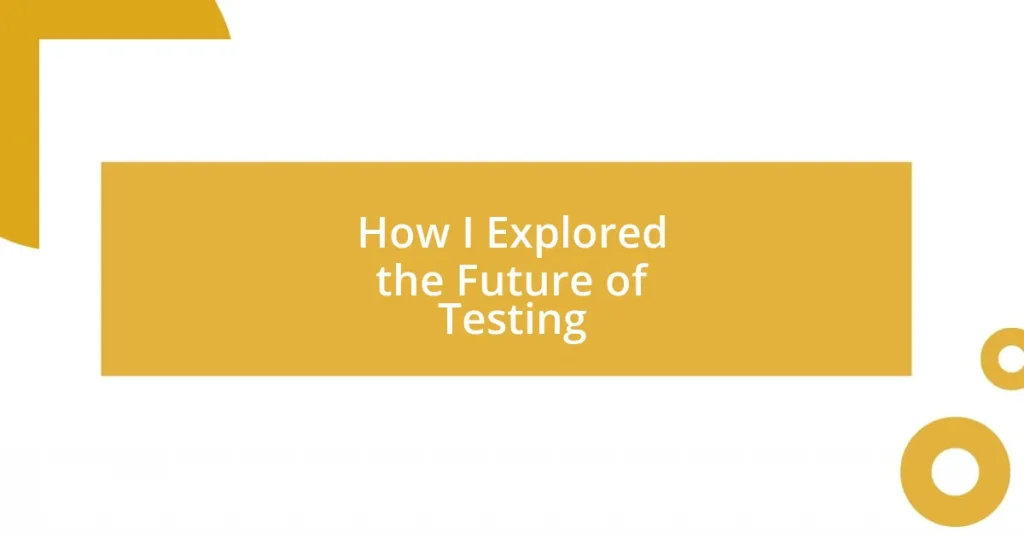Key takeaways:
- Genetic exploration empowers individuals by revealing health risks and ancestral connections, allowing for proactive health management.
- Selecting the right genetic testing requires consideration of purpose, reputation, privacy, consultation, and cost.
- Interpreting genetic test results benefits from expert guidance, emphasizing that genetics inform but do not dictate one’s path.
- Engaging with genetic communities fosters a sense of belonging and enhances personal growth through shared experiences and knowledge.
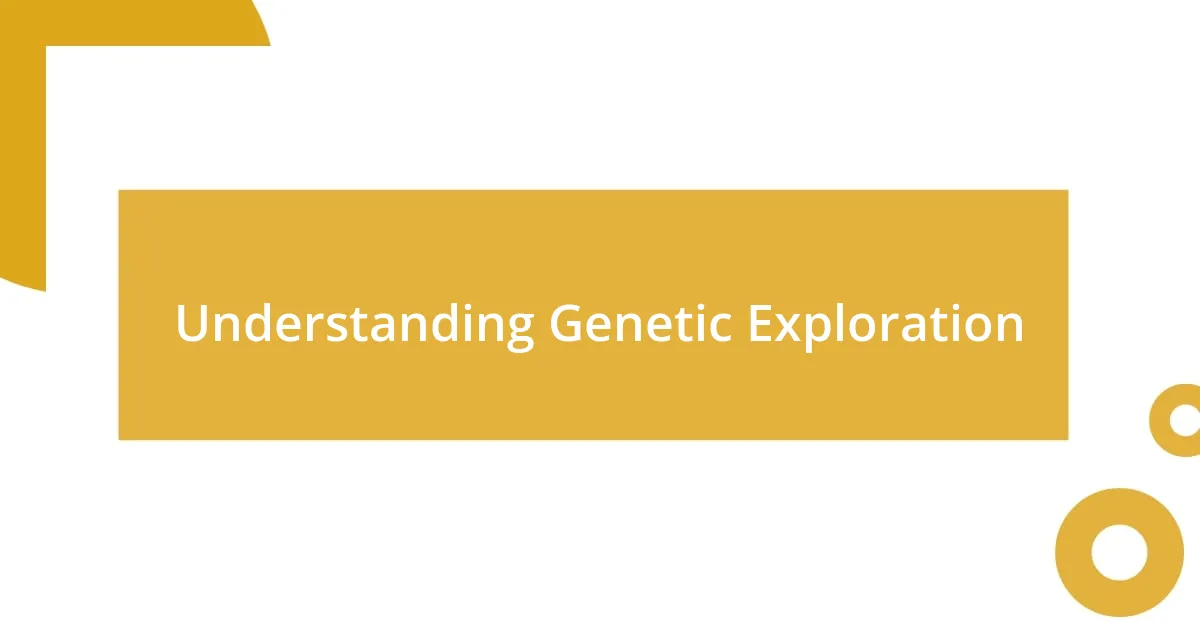
Understanding Genetic Exploration
Genetic exploration is a fascinating journey into the intricacies of our DNA, revealing not just our biological makeup but also potential health risks and inherited traits. I remember the first time I delved into my genetic results and felt a mix of excitement and trepidation. What if I uncovered something profoundly impactful about my family history or my own health? It felt like turning the pages of a family story that had been hidden for too long.
As I sifted through my results, I was struck by the connection I felt to generations before me. Each marker told a tale of migrations, adaptations, and unique traits passed down through time. Have you ever wondered just how much of who you are is written in your genes? This question lingered in my mind, prompting me to explore not only my ancestry but also my personal health strategies—like making lifestyle changes based on potential genetic predispositions.
I found that understanding genetic exploration isn’t just about curiosity; it also empowers us. It allows us to take proactive steps in our health and wellness. By learning about possible hereditary conditions in my family, I felt prepared to discuss these with my healthcare provider. How liberating it is to take control of our health narrative, using genetics as a tool rather than a strict blueprint!
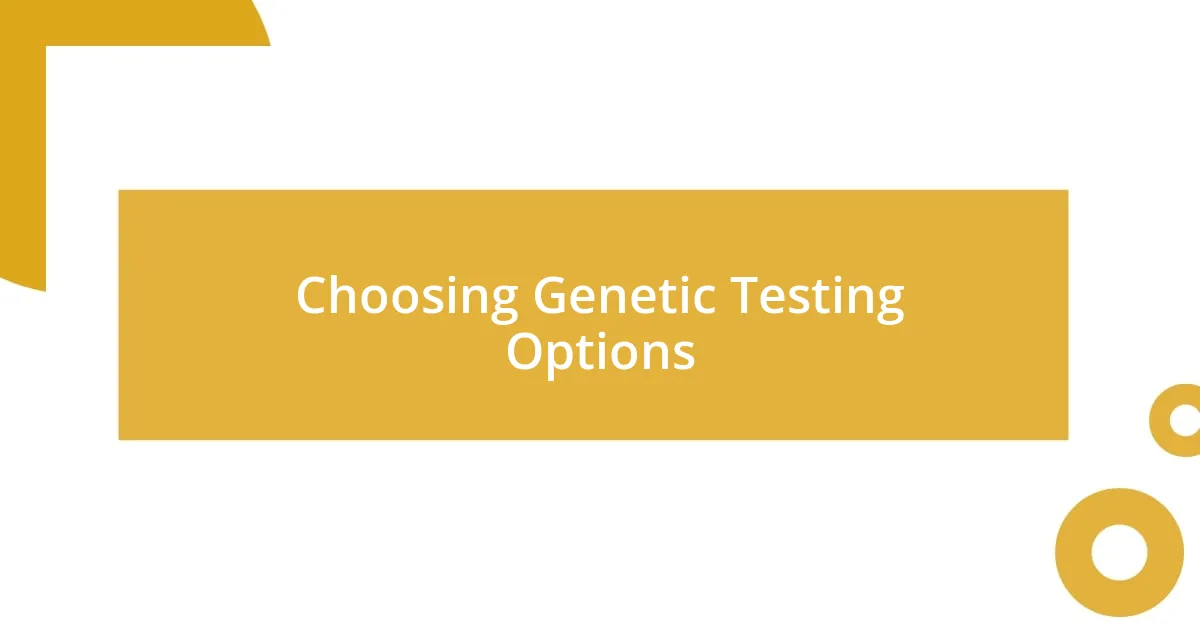
Choosing Genetic Testing Options
Choosing the right genetic testing option can feel overwhelming, but it’s a vital step in uncovering your genetic potential. When I was faced with different types of tests, I realized it’s essential to evaluate what you hope to gain from the experience. For me, connecting with my health and ancestry was paramount, so I focused on tests that could illuminate both my genetic makeup and any potential health risks.
Here are some key factors to consider when selecting genetic testing options:
- Purpose: Determine if you are looking for ancestry insights, health risks, or both.
- Reputation: Research the companies providing these tests; user reviews can guide you about accuracy and reliability.
- Privacy: Ensure you understand how your genetic data will be stored and shared.
- Consultation: Consider speaking with a genetic counselor for professional advice tailored to your needs.
- Cost: Weigh the potential benefits against the price and insurance coverage options to choose what fits your budget.
Navigating these choices can be as revealing as the results themselves. I recall second-guessing my decision, pondering whether I should go with a popular brand or something less mainstream. Ultimately, I chose a reputable company that provided comprehensive health insights. That decision turned out to be defining, sparking conversations with my family about our health history and revealing patterns I never considered before.
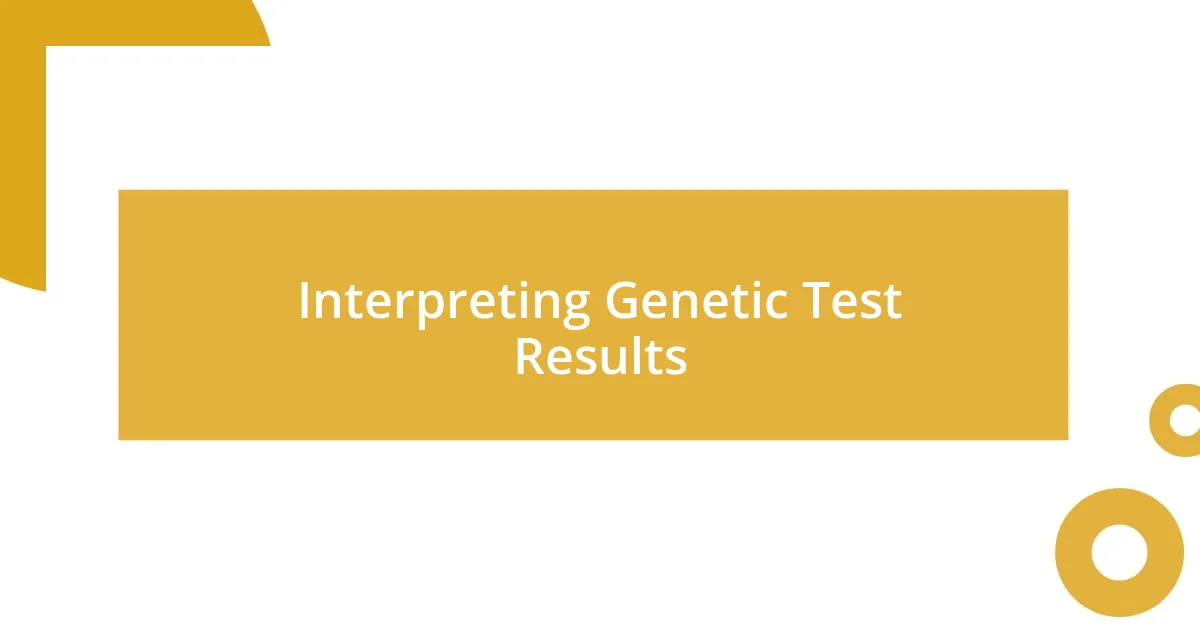
Interpreting Genetic Test Results
Interpreting genetic test results can be an intricate process. When I first received my results, I felt a wave of emotions—curiosity, anxiety, and hope. The data can often seem like a puzzle, with each piece representing health risks, traits, or even ancestry connections. It took me time to grasp what each marker truly means. I remember pulling out a notebook to jot down questions, ready to dive deep into what my genetic makeup was saying about me.
As I analyzed my results, I found that seeking expert guidance was invaluable. Genetic counselors can help demystify complex terminology and give context to your findings. I was fortunate to chat with a counselor who clarified my predispositions for certain conditions. It was enlightening to understand that while genetics play a role, they don’t dictate my fate. This perspective inspired me to make lifestyle adjustments that felt empowering rather than daunting.
Understanding context is crucial. I learned that not all genetic markers are created equal; some indicate increased risk without guaranteeing a condition. It’s about balancing knowledge with acceptance. Reflecting on my results made me reevaluate my health priorities, embracing a proactive approach to wellness tailored to my unique genetic profile.
| Key Factors | Considerations |
|---|---|
| Health Risks | Look for variants that indicate susceptibility to diseases. |
| Traits | Examine characteristics like eye color or lactose intolerance. |
| Ancestry | Explore your lineage through markers that trace geographic origins. |
| Actionable Insights | Seek information that can guide lifestyle changes or preventative measures. |
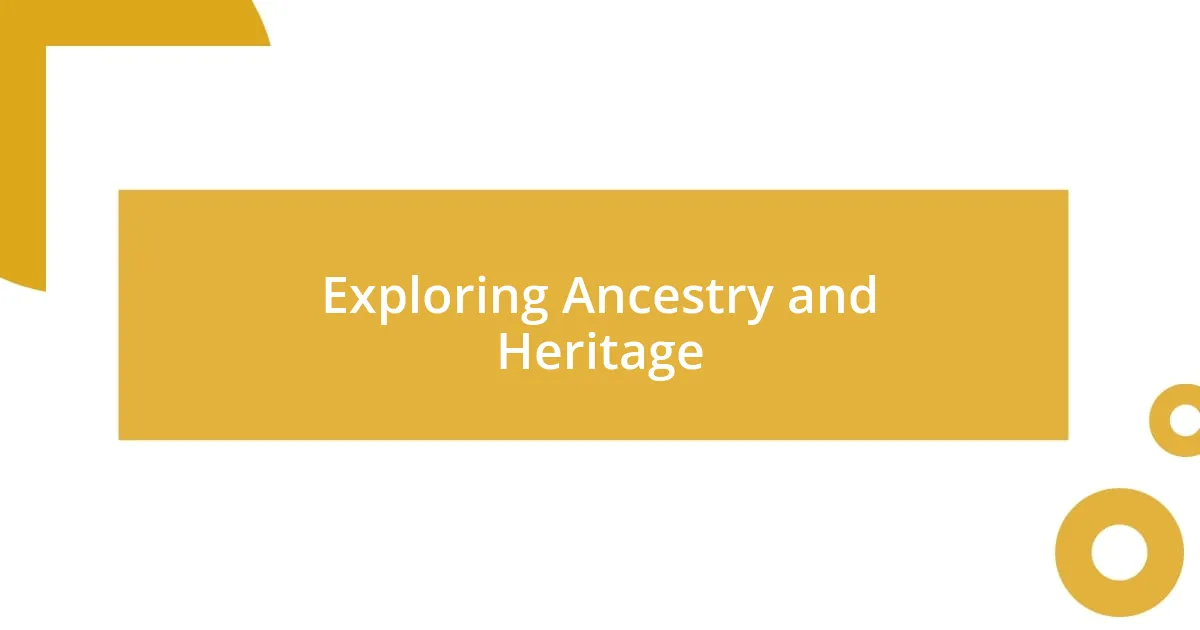
Exploring Ancestry and Heritage
Exploring my ancestry opened up a world of surprising connections. One day, while researching family branches, I discovered that my great-great-grandparents immigrated from Italy. This revelation not only deepened my pride in my heritage but also sparked curiosity about culinary traditions those ancestors brought with them. I often find myself asking: “What recipes might have been passed down through generations?” This question ignited a passion for cooking traditional Italian dishes, bringing my family together in a delicious journey through history.
As I dove deeper into my family tree, I encountered unexpected stories that shaped who I am today. I unearthed tales of resilience and bravery, particularly about a distant relative who fought in a significant war. Reflecting on these narratives made me feel a strong sense of belonging, as if I were weaving their experiences into the tapestry of my own life. It’s fascinating how learning about our ancestral struggles can influence our approach to challenges, don’t you think?
Additionally, using online tools to map out my heritage felt like piecing together a puzzle of my identity. I found it exhilarating to connect with distant relatives I never knew existed. Each new discovery made me ponder: how many stories and legacies are waiting to be uncovered? I remember the joy of reuniting with a cousin after discovering our shared lineage; we spent hours sharing old family photos and piecing together the past. That’s when I realized that exploring ancestry isn’t just about understanding where we come from, but also about fostering connections in the present.
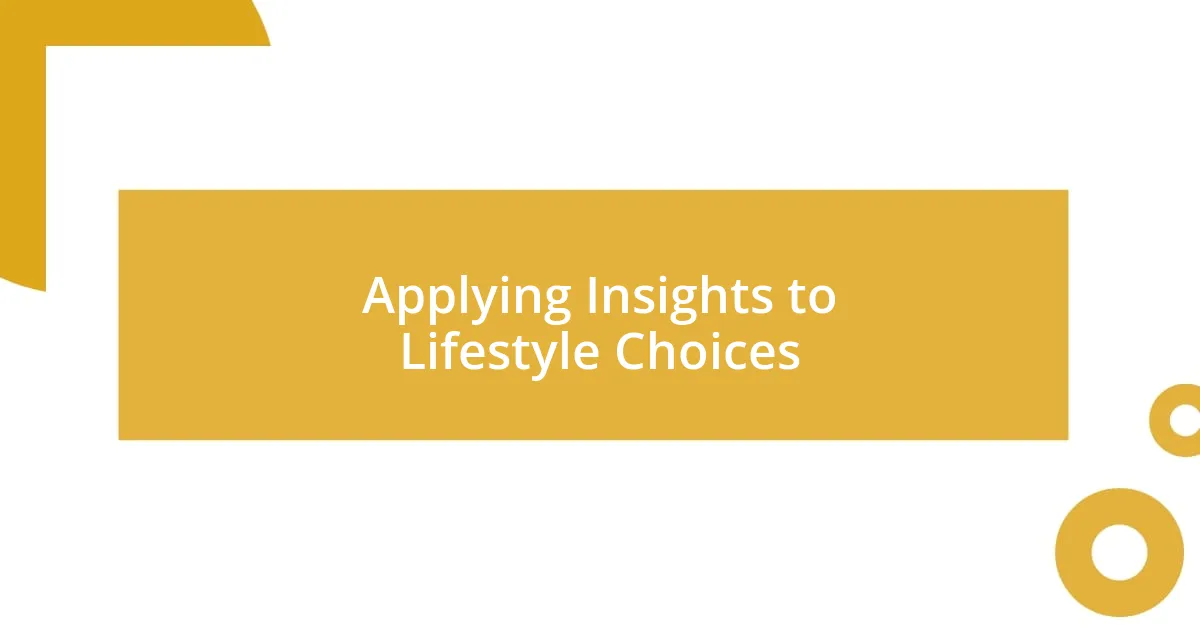
Applying Insights to Lifestyle Choices
Discovering my genetic potential reshaped how I approached my daily choices. For instance, I learned about my likelihood of being lactose intolerant, which prompted me to explore dairy alternatives. Initially, I felt hesitant—would coconut yogurt really satisfy my cravings? To my surprise, not only did it taste delicious, but my stomach also felt much better. This minor adjustment highlighted how understanding my genetics could directly enhance my quality of life.
I also uncovered some genetic markers suggesting a predisposition to anxiety. Instead of feeling overwhelmed, I embraced it as an opportunity for self-improvement. I incorporated mindfulness practices into my routine, like meditation and yoga. It’s interesting how something as simple as a daily deep-breathing exercise can ground me, making me feel like I’m taking charge of my genetic narrative rather than letting it control me.
The insights from my genetic exploration pushed me to examine other lifestyle factors, like my exercise regimen. I discovered that my genes favored endurance activities over weightlifting. Armed with this knowledge, I shifted my workouts to focus on running and cycling, ultimately discovering a newfound love for these activities. Have you ever felt more energized after choosing a workout that aligns with your body’s natural strengths? For me, it was like unlocking a hidden reservoir of motivation and joy, reinforcing the idea that our genetics can guide us toward more fulfilling lifestyle choices.
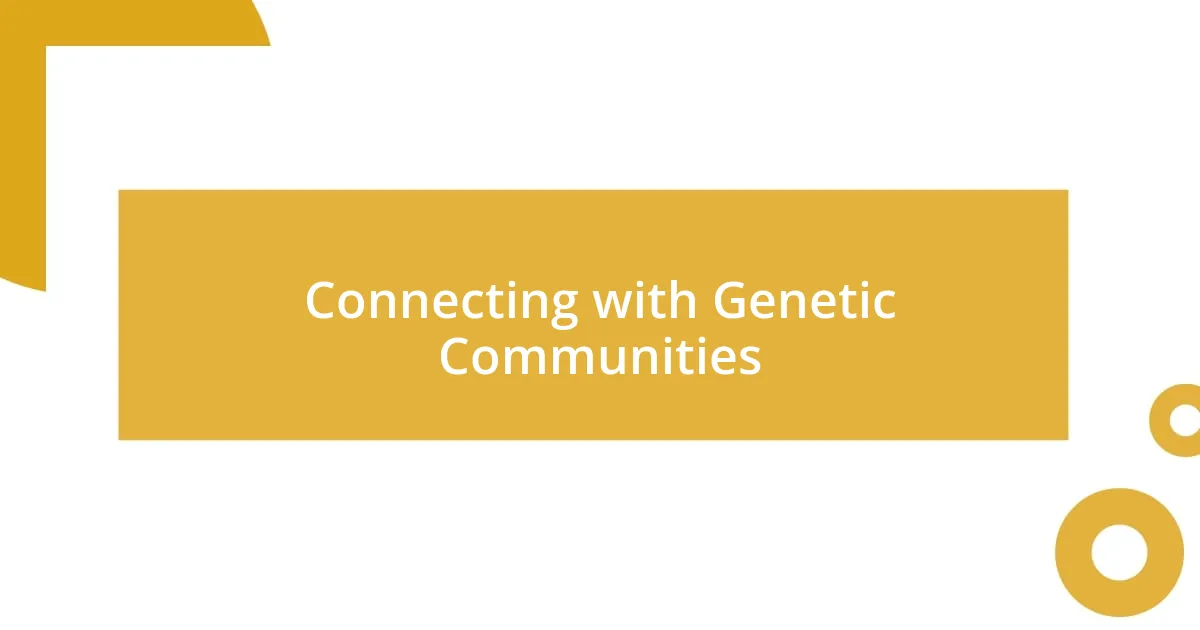
Connecting with Genetic Communities
Connecting with genetic communities can be a transformative journey. I remember the first time I joined an online forum dedicated to genetic exploration. It felt like stepping into a vibrant tapestry of shared stories and experiences, where each thread represented someone’s unique journey. Engaging with others who were navigating similar paths helped me realize I wasn’t alone in my curiosity, and their insights often sparked new ideas for me to explore.
One particularly memorable moment was when a community member shared how their genetic results impacted their health decisions. Inspired by their experience, I found myself reflecting on my own choices and how they could be influenced by a deeper understanding of my genetics. As I connected with these like-minded individuals, I often wondered: How many of us are quietly searching for a sense of belonging in our family histories? It was reassuring to know that we were all exploring these uncharted territories together.
I also appreciated the conversations that went beyond facts and figures. Discussions about personal identity and cultural pride emerged, revealing how our genetic backgrounds shape our present lives. I felt a sense of camaraderie as we shared our triumphs and challenges. Who knew that connecting over genetics could lead to such profound relationships? These interactions enriched my journey, reminding me of the powerful bonds that can form around shared ancestry and genetic curiosity.
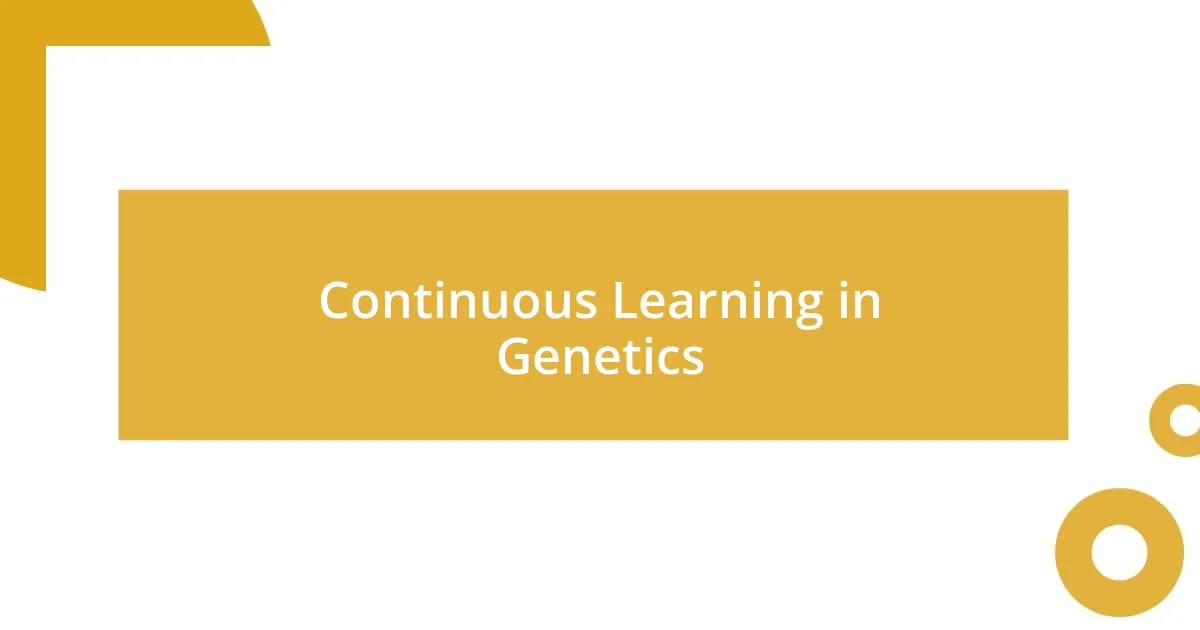
Continuous Learning in Genetics
Continuous learning in genetics is an integral part of my journey. I recall diving into a webinar hosted by a geneticist who specialized in epigenetics, or how our environment influences gene expression. As I listened, I realized that even small lifestyle changes could potentially activate or deactivate certain genes. It was an eye-opening moment—who knew that my environment played such a crucial role in shaping my genetic destiny?
I also dedicated time to reading the latest studies on nutrition and genetics, discovering how personalized diets could impact my well-being. One article particularly resonated with me, outlining how individuals with certain genetic profiles could benefit from higher omega-3 fatty acid intake. I remember incorporating more foods like salmon and chia seeds into my meals. It felt empowering to take control of my health choices based on solid evidence—not just trends but genetic insights.
As I explored various genetic podcasts, I found myself captivated by stories of individuals who had transformed their lives through knowledge. I often wondered: What if understanding our genetic makeup could lead us to the best versions of ourselves? Each story highlighted the powerful connection between knowledge and action, encouraging me to keep exploring. I’ve come to realize that this ever-evolving field invites us all to stay curious, ask questions, and remain open to learning more about the intricate links between our genes and our daily lives.
